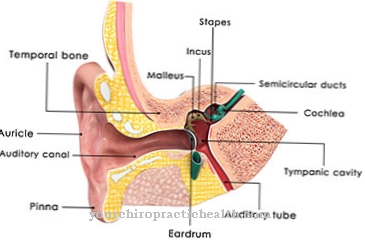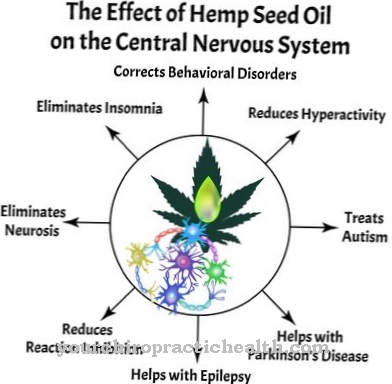Children who learn to read well before their peers and who show a strong fascination for letters and numbers sometimes owe their extraordinary abilities to a syndrome known as Hyperlexia referred to as. This is considered to be a possible sign of autism, Asperger's or Williams-Beuren syndrome.
What is hyperlexia?

© JenkoAtaman– stock.adobe.com
Hyperlexia, from the Greek “hyper” (over) and “lexis” (pronunciation, word), denotes a child's noticeably well-developed ability to read. However, this is accompanied by difficulties in understanding the spoken language and using it correctly, as well as difficulties with social interactions.
The syndrome was first identified in 1967 by Norman and Margaret Silverberg, who defined it as the precocious reading ability without prior practice that typically occurs before the age of five. They found that affected children have a talent for deciphering words that is far beyond their reading comprehension. Many experts believe that hyperlexia is indicative of autism.
Others, such as Darold Treffert, differentiated different types of the syndrome, only some of which are associated with autism and Asperger's syndrome. These are neurologically normal children who are very early readers (type 1), autistic children who develop early reading skills as a special talent (type 2) and children who show traits similar to autism that disappear with increasing age (type 3).
causes
The exact causes for the development of hyperlexia are not known. The syndrome is thought to be due to overdevelopment of certain areas of the brain while others remain underdeveloped. If the phenomenon occurs as a result of autism or Asperger's, possible explanations can be found here. Various triggers of autism are currently being investigated.
For one, genetic factors can play a role. More than 100 genes and more than 40 gene locations that are involved in the disease have already been identified. The many possible combinations of genetic deviations ensure the great diversity and breadth of the autism spectrum.
Symptoms, ailments and signs
In 2004, researchers discovered signs of a change in connectivity, i.e. the large-scale flow of information, in the brains of Asperger's patients. Brain scans showed both areas of increased and decreased activity, as well as a lower synchronization of the activity patterns of different brain areas. In addition to global sub-connectivity, i.e. reduced linkage, local over-connectivity also often occurred.
This is understood as the over-specialization of certain brain activities. The resulting peculiarities in the behavior of the patient, for example in the recording of connections between feelings, people and things, can also be observed in hyperlexic children. Therefore, studying the triggers of autism and Asperger's can shed light on the causes of hyperlexia syndrome.
Diagnosis & course of disease
Children with hyperlexia tend to have an average or slightly above average IQ. They have an exceptional talent for deciphering languages and therefore become very early readers. In most cases, they develop normally up to the age of 18 to 24 months, only afterwards do the abnormalities occur more frequently.
If a child is able to spell long words before the age of 2 and read full sentences before they are 3, they may have the syndrome. Other talents include fast letter and syllable counting and reading backwards. At the same time, noticeable communication difficulties can often be observed in the children.
Many of them learn to speak only through intense repetition and have difficulty learning the rules of a language through examples or trial and error. This often brings with it social problems, including the fact that hyperlexic children have less interest in playing or communicating with others. They seldom initiate conversations; they often develop special and unusual fears.
The children use echolalia, repeating sentences and words, to develop their language. They often have a large vocabulary and can name many objects, but do not understand how to apply their language skills in the abstract. There are no spontaneous expressions and the pragmatic use of language is underdeveloped.
Hyperlexic children often have trouble answering where, how, and why questions. It is not uncommon for those affected to be cognitively overwhelmed by parents, educators or teachers who expect special abilities and achievements from them in other areas besides reading. In everyday life, they need routines, as they encounter difficulties in making changes with ritual behavior.
Complications
The hyperlexia mainly causes psychological complaints that cannot be treated in every case. In many cases, children have special gifts or abilities so that they learn to read or do arithmetic relatively early on. In addition to these positive aspects, there are also restrictions in other areas of life, which can make everyday life for the affected children very difficult.
Furthermore, there can be communication difficulties, for example, which can lead to teasing or bullying, especially among children. Most children with hyperlexia also have no need to play or talk to other children. It is not uncommon for them to develop fears of communication and contact with other people. If these fears are not addressed in childhood, serious social problems can arise in adulthood.
The treatment itself does not lead to particular complications and is usually carried out through various therapies. However, it cannot be predicted whether the therapies will be successful and lead to a positive course of the disease. It is not uncommon for parents to also suffer from psychological complaints due to hyperlexia.
When should you go to the doctor?
If a child shows behavior abnormalities in direct comparison with other children of the same age, these should be discussed with a doctor. If the development of the child is changed or not age-appropriate, there are often diseases that require treatment or the child needs special support for the existing skills. Medical tests are done to help diagnose any disorders or level of development. If the person concerned finds it difficult to establish connections between people, things and feelings, this is considered unusual. If contexts cannot be captured, a doctor should be consulted.
If letters and words are learned very early without the influence of adults, this observation should be pursued further. If long words can be spelled at a very young age, it is advisable to consult a doctor. If there are difficulties in the areas of communication, feelings or physical closeness, a doctor should be consulted. If the rules of language cannot be understood despite a lot of practice, a visit to the doctor is advisable. A doctor should take a closer look at the behavior of children who show little interest in social contact or playing with toys. If the child's parents or caregivers recognize that the child does not accept the patterns to be learned, a doctor as a neutral observer should be asked for advice.
Doctors & therapists in your area
Treatment & Therapy
Hyperlexia can be treated if the condition is diagnosed early enough. This requires intensive speech therapy, which should be started at an early stage in child development. This enables the child to acquire better language skills and develop social skills more easily.
If they already have advanced reading skills, they should be used as the primary approach to speech therapy. It is important that experts, parents, educators and teachers work together as a team. Applied Behavior Analysis ("ABA"), which is often used in the treatment of autism, can also be successful in the related hyperlexic syndrome.
It is a holistic form of therapy that has also included teaching language skills since the 1980s. The aim of these measures is to develop social and communicative skills. The children's already existing skills are used as the basis on which the therapy program is built. The parents are included in the treatment, attempts and successes in learning are reinforced as directly as possible.
You can find your medication here
➔ Medication to lighten the moodOutlook & forecast
The ability to learn letters and numbers before other children are not stopped or treated. It is the result of an above-average intelligence of the child and in most cases indicates another disorder present. For this reason, hyperlexia is not an independent disease that is treated. It is the result of an underlying disease that has to be diagnosed and treated medically. In most cases there is a brain disorder which, despite the above-average ability to deal with numbers and letters, leads to a reduction in opportunities in other areas of life. Often it is not possible for the patient to lead an independent life.
The patient's treatment needs are not geared towards hyperlexia and are therefore not given priority. Rather, support measures take place so that the competencies of hyperlexia are used and the patient is not under-challenged in this area, which in turn can trigger new complications.
The prospect of a cure or minimization of the hyperlexia can be classified as constant for the reasons mentioned. In a speech or behavior therapy, existing cognitive possibilities are promoted and the handling of the ability is trained. In most patients, this leads to an improvement in the emotional state and thus to a better well-being.
prevention
Since the causes of hyperlexia are still largely unexplored, no preventive measures can be recommended. In connection with autism, theories have repeatedly emerged in recent years that interpret the disease as a possible consequence of vaccine damage. However, these have not yet been proven and in the case of vaccines containing thiomersal have even been refuted. So refusing a vaccination most likely does not protect against autism and hyperlexia.
Aftercare
In most cases of hyperlexia, follow-up measures are severely limited. Here, the person concerned is primarily dependent on a quick diagnosis and subsequent treatment so that further complaints or complications can be prevented. This also prevents the symptoms from worsening.
The disease does not really need to be treated by a doctor, but the children need strong support in their lives so that they can properly practice their skills. Parents must recognize the hyperlexia early on and have it examined by a doctor. After that, the children are dependent on special support.
Behavioral therapy may also be necessary in some cases to alleviate the symptoms of this condition. Care and support from one's own family or relatives and acquaintances also helps to alleviate or even prevent psychological upsets or depression. Parents must inform themselves correctly and completely about this disease. Contact with other sufferers of hyperlexia can also be very useful, as this often leads to an exchange of information.
You can do that yourself
Parents of affected children should primarily organize speech therapy for their child. If therapeutic treatment is started, language skills can be promoted and social restrictions can be reduced. Therapy must be supported by the parents at home by reading and calculating a lot with the child. If the child already has advanced reading skills, reading skills can be improved in a targeted manner. The child may be able to start school earlier and use their intellectual abilities to the full.
In addition, behavioral therapy is always indicated. Behavioral training at an early stage is especially important for children who experience the hyperlexia associated with autism. Parents or legal guardians should be trained for this and, if necessary, speak to other parents. This enables the optimal treatment for the child to be found.
If, despite everything, the child has difficulties integrating, further therapeutic advice may be useful. The child may need to attend special needs school or take medication to relieve symptoms accompanying the underlying autism disorder. The pediatrician or a child psychologist can decide which measures are to be taken in detail.













.jpg)

.jpg)
.jpg)











.jpg)